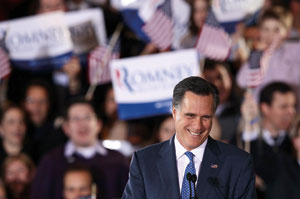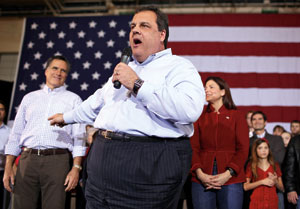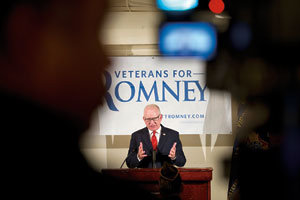CQ WEEKLY – COVER STORY
Aug. 25, 2012 – 10:55 a.m.
The Leader and the Pack
By Joseph J. Schatz, CQ Staff
Texas Gov. George W. Bush did something in 1999, when he was gearing up to run for president, that would look very out of place in 2012: He took a swipe at the Republicans who then controlled Congress.

|
||
|
During one of their many budget-cutting battles with President Bill Clinton, House Republicans had proposed delaying tax credits for low-income Americans. “I don’t think they ought to balance their budget on the backs of the poor,” declared Bush, the self-styled “compassionate conservative.”
His remark caused an intraparty flap and led to bad feelings between the House GOP leadership, whose public popularity had been hurt by the impeachment of Clinton, and the fast-rising presidential candidate. But by the following year, budget surpluses had supplanted concerns about fiscal constraint, and Bush had gone on to claim his party’s nomination and to win the presidency. The die had been cast, and the energy in the Republican Party for the next eight years flowed far more from the White House than from the lawmakers on Capitol Hill, who largely did Bush’s bidding.
As Willard Mitt Romney prepares to accept the GOP presidential nomination this week in Tampa, the times couldn’t be more different — and neither could the dynamics in the Republican Party.
Gone are the days of budget surpluses, and the conservatives who run the show in the House GOP majority disavow what they regard as the fiscal excesses of Bush’s presidency: spending on two wars, an expansion of Medicare, thousands of congressional earmarks and an abandonment of the conservative-led effort to begin moving Social Security toward an individually directed program.
Those congressional conservatives see themselves as the leaders of the party today. That was evident in February, when then-presidential contender Newt Gingrich criticized the fiscal plan produced by House Budget Chairman — and now vice presidential pick —
Romney, a former governor of Massachusetts, didn’t make that mistake. More than other recent Republican contenders, except perhaps self-styled maverick Sen.
And, of course, Romney tapped Ryan earlier this month to be his running mate, a move that has energized conservatives who see the seven-term House member from Wisconsin as an economic visionary.
To many, Romney’s moves over the past year demonstrate not only an effort to rally a GOP base that has been lukewarm to his brand of conservatism, but also an acknowledgment that the ideological core of the Republican Party resides not in Romney’s Boston headquarters but on Capitol Hill. In particular, the House Republican Conference has, for better or worse, been the party’s principal lever of influence during the past four years.
Some take it a step further and say that the pendulum may be swinging back to favor the congressional wing of the Republican Party in a more permanent way. That perceived swing in power may gain momentum from Romney’s shifting political record, which leaves many wondering about his approach to policy making and questioning whether he would govern accordingly if elected in November.
Grover Norquist, the influential president of Americans for Tax Reform, is one who anticipates that congressional conservatives — not a Romney White House team — would run the show. “Their job is to sign the bills, not to come up with a program,” said Norquist during a roundtable with CQ Roll Call editors and reporters earlier this summer. “It’s now going to be a more congressionally driven agenda than the past,” he said, noting that there is a “consensus” within the party. “He, as leader of the team, will manage that consensus.”
Capitol Hill or Statehouses?
The Leader and the Pack
Whether Norquist’s prediction will hold true on the campaign trail remains to be seen. Romney’s hewing to the House Republican line has handed President Obama a crucial piece of ammunition as November approaches because Ryan and his budget help mobilize the Democratic faithful just as much as they energize conservatives. One sign of possible ambivalence is that, even after picking Ryan as his running mate, Romney hedged on whether he now embraces the House budget plan as his own.
And for all their influence in the party, House Republicans remain, as a whole, quite unpopular nationally. This week in Tampa, the roster of prime-time podium speakers is long on governors and other national Republican luminaries, such as the keynoter Gov.
In fact, a more popular band of Republicans resides in the nation’s statehouses. GOP governors are also influential players in the party and are likely to serve as sounding boards for Romney, particularly given that he was one of them not so very long ago. Nine Republican governors — Christie, South Carolina’s
Walker is a conservative hero for taking on public-employee unions — and for surviving a recall election earlier this year. Christie and Indiana Gov.
Some governors have already given Romney advice. At the July meeting of the Republican Governors Association, GOP chief executives urged him to release more of his tax records as a way to neutralize a major talking point of the Obama campaign.
“Republicans have this whole class of first-term governors who are immensely talented and are moving all sorts of innovative policies at the state level,” says Michael Franc, vice president of government studies at the Heritage Foundation. “I think they’re going to look to the governors a lot.”
Moreover, history shows that presidents usually seize the upper hand in their parties soon enough, and Romney may be no different. That is one reason conservatives will be watching closely to see how firmly he tacks to the center as the election approaches. Thus far, however, 2012 has all the makings of an election geared toward each party’s base, much as was the case in 2004.
The assemblage of House GOP lawmakers that Romney would deal with “is a much more conservative caucus than it was when President Bush was in office,” says Oklahoma GOP Rep.
And if Romney wins, his ability to carry out much of his stated agenda will depend both on Republicans keeping control of the House — a near certainty, based on current polling — and on whether the party ekes out a majority, or at least a tie, in the current Democratic Senate.
“We need him, he needs us,” Cole said of Romney.
Unified, if not Enthusiastic

|
||
|
House Speaker
The Leader and the Pack
“Listen, we’re just politicians. I wasn’t elected to play God. The American people probably aren’t going to fall in love with Mitt Romney.”
But for all the talk of an enthusiasm gap for the party’s choice for president, there is little question that the Republican coalition of corporate leaders, social conservatives, anti-tax crusaders and tea party firebrands is nonetheless unified.
Despite conflicts over the debt ceiling and myriad spending issues on the margins of the federal budget, the business community has largely made its peace with the tea party. “They are not crazies,” said U.S. Chamber of Commerce President Thomas J. Donohue in May. “We understand we’re going to get some long-term benefit here.”
This sense of GOP unity will be on display in Tampa, with speakers ranging from tea party favorite Sen.
Romney has overcome questions among evangelicals about his Mormonism and questions among conservatives about the moderate stances he took as governor of Massachusetts less than a decade ago. For many congressional conservatives, their relationship with the 65-year-old former private-equity manager is strictly utilitarian. When asked about their connection to Romney, they don’t gush. Instead, they note that he has endorsed Ryan’s budget and intends to implement it. The enthusiasm that Ryan’s selection as running mate generated was notable for the contrast.
The question for many, then, is how would Romney govern?
A case in point is health care. As governor of Massachusetts from 2003 until 2007, he governed as a moderate — which is how Bay Staters like their Republican chief executives. In Massachusetts, Romney’s role was “playing defense,” says Norquist, against an overwhelmingly Democratic legislature.
Romney has tried to pull off a difficult balancing act throughout the 2012 campaign, claiming to be staunchly opposed to Obama’s signature health care law even though key parts of it were based on his own re-write of the health care system in Massachusetts. Most of Romney’s key advisers, including Beth Myers, who led his vice presidential search, Peter G. Flaherty II and Eric Fehrnstrom, date from his time as governor.
With his family’s political legacy — father George Romney was governor of Michigan in the 1960s and ran for president in 1968 — the GOP standard-bearer has strong ties to some establishment Republicans in Congress. They include Michigan’s
But trust was slow to build among the conservatives who have been pushing the House GOP caucus to the right and playing an increasingly influential role in the Senate Republican caucus under Minority Leader
Missouri Sen.
Johnson says he was “totally convinced” of Romney’s commitment to reducing the size of government and “fairly convinced he was committed to repealing Obamacare.”
The Leader and the Pack
Still, conservatives such as Johnson may face risks in allying themselves with a potential winner whose conservative values are viewed by many others as wobbly at best.
McMorris Rodgers says lawmakers had many questions in advance of the Supreme Court’s health care decision about what Romney’s response would be, depending on the outcome. “We’re making sure members are aware what the governor’s priorities are from week to week,” she says. “We’re really doing our best to make sure, as Republicans, we’re coming out with a clear and consistent message.”
Again, McMorris Rodgers comes back to Romney’s embrace of the House budget. “If Gov. Romney is elected president, the budget he puts forward will be the most important budget in 50 years,” she says. “We must elect a new president — that is what is unifying Republicans.”
‘Balance Will Shift’
The focus of House Republicans on Romney’s attitude toward the budget underscores their obsession with shrinking the federal government. But it also touches on the awkward subject of how the last Republican president used the office.
After his disputed election in 2000, Bush quickly consolidated his authority, moving early to promote his signature tax cuts. After the Sept. 11 terrorist attacks, Bush got most of what he wanted from congressional Republicans for the rest of his first term — and not just on military matters and foreign policy concerns. Conservatives agreed to strengthen the federal role in elementary and secondary education with the so-called No Child Left Behind Act, and they backed the creation of a prescription-drug benefit under Medicare — a move that would come back to haunt them as the bailouts of 2008 began to sour conservatives and sparked the tea party movement.
Fast forward to 2012, and many of those Republicans are gone, after paying the price for their free-spending ways in tea-party-fueled primary battles in 2010. The rest are repentant, promising never again to embrace such an expansive federal agenda.
“There is going to be a group that’s going to be holding his feet to the fire,” Johnson says he told Romney.
Norquist and some other conservatives liken the current dynamics to the 1980 presidential campaign, when contender Ronald Reagan endorsed the proposal of supply-side economics guru Rep. Jack F. Kemp for a broad-based tax cut — known as Kemp-Roth, after the New York Republican and its other GOP sponsor, Sen. William V. Roth Jr. of Delaware. Reagan made that tax cut the linchpin of his economic program.
Kemp went on to be secretary of Housing and Urban Development under President George Bush and was Sen. Bob Dole’s vice presidential running mate in 1996. And, as it happens, he was an important mentor to Ryan.
“Ronald Reagan borrowed the centerpiece of his domestic policy agenda from Congress when he came out for the Kemp-Roth tax cut,” wrote W. James Antle III, associate editor of the conservative magazine, American Spectator, in June. “Just as Reagan became a convert to supply-side economics by signing Jack Kemp’s ideas into law, Romney can shed his reputation for timidity and become the face of free-market entitlement reform by doing the same for Paul Ryan’s.”
Franc of the Heritage Foundation calls it “a natural development, when a party’s only real base of power in Washington is the House, for the thought leaders to emerge there.” Franc says he expects Camp, Armed Services Chairman
However, “at some point, as a president has his or her appointees in place, that balance will shift,” Franc says, noting that Reagan started with Kemp as his primary adviser. “But then his people emerged.”
The Leader and the Pack

|
||
|
Obama was perceived to have strong congressional ties when he entered office, based mainly on the long Senate career of Vice President
It stands to reason that Ryan — given his close relationship with the other “Young Guns” of the House, including Majority Leader
Still, no matter the party, presidents and congressional leaders have different constituencies.
Congressional Republicans have already bowed to Romney’s wishes on a few issues, such as extending the 3.4 percent interest rate on some student loans. Congressional Republicans initially expressed hesitation about preserving the current low rate, but in the spring Obama made it a campaign issue; Romney, in turn, called for action, and Republicans worked out a deal.
Moreover, Romney’s strategy of linking himself closely to the House Republican caucus carries risks beyond simply the controversial Ryan budget. While he needs an energized GOP base to come out in November, Romney also needs to court independent voters to win. And many of them aren’t convinced that Congress is providing the right leadership.
Broad congressional approval scores are perhaps minimally useful in predicting election outcomes, but it’s still the case that Boehner’s Congress drew a dismal 12 percent approval rating in a mid-August NBC News/Wall Street Journal survey. That’s about where lawmakers have been mired since the debt ceiling crisis last August.
Also, it isn’t evident that Congress in 2013 would be capable of leading the government under a President Romney. Boehner himself is no favorite of the tea party, and he must constantly walk a fine line to keep the Republican Conference following his lead. With Ryan in the vice president’s office, the Speaker would have lost one of the chamber’s most important intellectual forces. And it’s by no means certain that McConnell will be Senate majority leader and that Boehner won’t still be contending with Democrats still in charge on the other end of the Capitol.
In addition, the blueprint for a successful GOP president may have changed along with the budgetary situation. During the Bush years, “you had Tom DeLay using earmarks and spending as a tool to govern. That whole model is gone,” says Franc. Come January, “the electorate they’re going to be reporting back to on weekends is very different than it was in 2001,” he says.
Democrats who want to turn swing voters away from Romney hope to use the prospect of Romney following the lead of House Republicans as a potent political threat over the next 10 weeks.
“By placing Chairman Ryan on his ticket, Gov. Romney is making the centerpiece of his campaign the two Ryan-designed, tea-party-inspired, disastrous budgets the House passed this Congress,” says House Minority Whip
At the same time, for House Republicans it’s a potent promise.
“There is no question that the president is the lead spokesman for the party,” says Rep.
The Leader and the Pack
WILLARD MITT ROMNEY
Residence: Belmont, Mass.
Born: March 12, 1947 • Detroit
Religion: Mormon
Family: Married Ann Romney in 1969 • five children: Taggart (born 1970), Matthew (1971), Joshua (1975), Benjamin (1978) and Craig (1981).
Education: Stanford University, attended 1965-1966 • Brigham Young University, B.A. 1971 (English) • Harvard University, J.D. 1975, M.B.A. 1975.
Career: Management consultant, Boston Consulting Group, 1975-1976, Bain and Company, 1977-1984 • co-founder and president, Bain Capital, 1984-1999 • president and chief executive, Salt Lake Organizing Committee for the 2002 Winter Olympics, 1999-2002.
Political highlights: Republican nominee for U.S. Senate in Massachusetts in 1994, lost to Ted Kennedy • governor of Massachusetts 2003-2006, defeated state treasurer Shannon O’Brien • sought Republican nomination for president in 2008, winning 11 state contests and garnering 294 delegates.
FOR FURTHER READING: Ryan budget, CQ Weekly, p. 596; facing the fiscal cliff, p. 800; debt limit fight, 2011 Almanac, p. 3-11; conflicts between fiscal and social conservatives, 2011 CQ Weekly, p. 854; rise of the tea party, 2010 CQ Weekly, p. 480; Obama’s election, 2008 Almanac, p. 10-3.